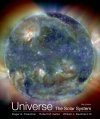About this book
This is an abbreviated volume of Universe by Freedman et al., focusing on the solar system. Known for their state-of-the-science coverage, the various Universe books place the basics of astronomy and the process of science within the grasp of introductory students. The fifth edition has been updated with new material and new discoveries.
Contents
I Introducing Astronomy
1 Astronomy and the Universe
Guest Essay Why Astronomy? Sandra M. Faber
2 Knowing the Heavens
Guest Essay Why Astrology Is Not Science James Randi
3 Eclipses and the Motion of the Moon
Guest Essay Archaeoastronomy and Ethnoastronomy Mark Hollabaugh
4 Gravitation and the Waltz of the Planets
5 The Nature of Light
6 Optics and Telescopes
II Planets and Moons
7 Comparative Planetology I: Our Solar System
8 Comparative Planetology II: The Origin of the Solar System
III Stars and Stellar Evolution
16 Our Star, the Sun
IV Galaxies and Cosmology
27 The Search for Extraterrestrial Life
Guest Essay A Biologist’s View of Astrobiology Kevin W. Plaxco
Customer Reviews
Biography
Roger A. Freedman is a Lecturer in Physics at the University of California, Santa Barbara, USA. At UCSB, Dr. Freedman has taught in both the Department of Physics and the College of Creative Studies, a branch of the university intended for highly gifted and motivated undergraduates. He has published research in nuclear physics, elementary particle physics, and laser physics. In recent years, he has helped to develop computer-based tools for learning introductory physics and astronomy and helped pioneer the use of classroom response systems and the "flipped" classroom model at UCSB. He is co-author of three introductory textbooks: University Physics (Pearson), Universe (Freeman), and Investigating Astronomy (Freeman).
Robert M. Geller teaches and conducts research in astrophysics at the University of California, Santa Barbara, USA. Using data from the Hubble Space Telescope, he is currently involved in a search for bursts of lights that are predicted to occur when a supermassive black hole consumes a star. Dr. Gellar als has a strong emphasis on education, and he received the Distinguished Teaching Award at UCSB in 2003.
William J. Kaufman III (deceased) was the author of the first four editions of Universe. During his career he held positions at the Griffith Observatory in Los Angeles, San Diego State University, UCLA, Caltech, and the University of Illinois. A prolific author, his many books include Black Holes and Warped Spacetime, Relativity and Cosmology, The Cosmic Frontiers of General Relativity, Exploration of the Solar System, Planets and Moons, Stars and Nebulas, Galaxies and Quasars, and Supercomputing and the Transformation of Science. Dr. Kaufmann died in 1994.



































